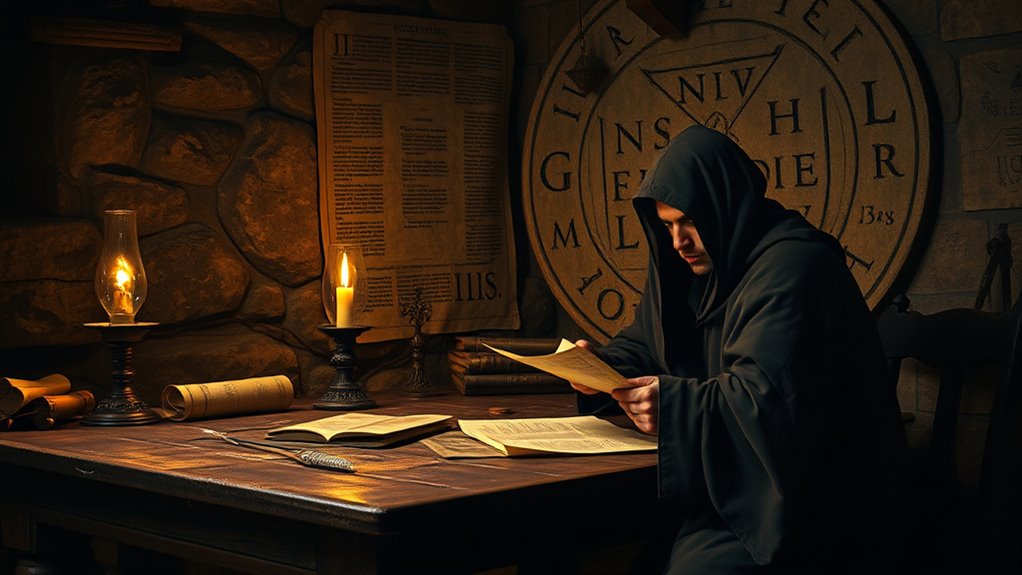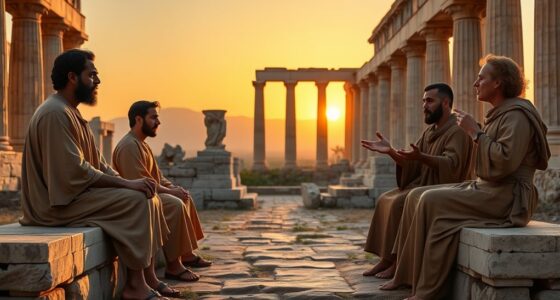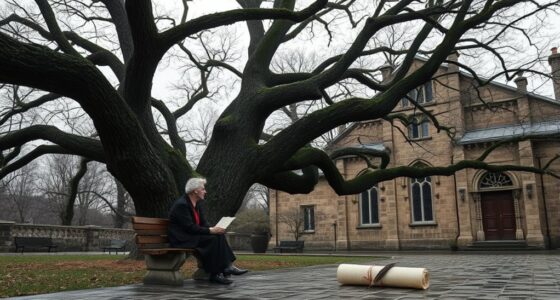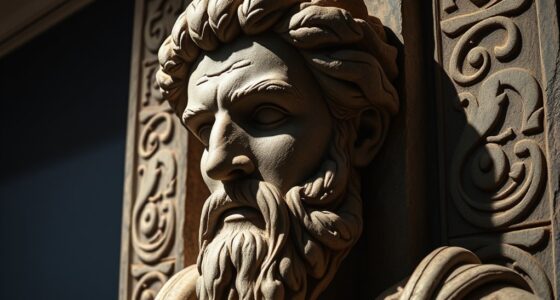You’re exploring Pyrrho of Elis, the philosopher who doubted everything. He believed that true knowledge is impossible, so he recommended suspending judgment on all matters. This radical skepticism encourages you to accept the limits of perception, acknowledge uncertainty, and avoid mental disturbance. By embracing doubt, you can find peace amid conflicting beliefs. If you keep exploring, you’ll discover how Pyrrho’s ideas promote calmness through recognizing the pervasive nature of uncertainty.
Key Takeaways
- Pyrrho of Elis is the ancient philosopher renowned for doubting all knowledge and advocating radical skepticism.
- His skepticism questions the reliability of sensory perceptions and the possibility of attaining certain truth.
- Pyrrho promoted suspending judgment (epoché) to achieve mental tranquility (ataraxia).
- His philosophy emphasizes humility about human understanding and the acceptance of perpetual uncertainty.
- Pyrrho’s radical doubt aims to cultivate peace by recognizing the limits of human knowledge and avoiding dogmatism.

Have you ever questioned whether you can truly know anything? If so, you’re not alone. Pyrrho’s radical skepticism invites us to grapple with this very doubt, pushing us to reconsider the certainty of our beliefs. At the heart of his philosophy lies the idea that our senses and perceptions are unreliable, leading to what we call perceptual uncertainty. You might look around and feel confident about what you see, hear, or touch, but Pyrrho challenges that confidence. He argues that our senses often deceive us, and this empirical doubt—doubting the evidence provided by our experiences—can undermine the very foundation of knowledge. When you think about it, how often are your perceptions truly accurate? Is what you see in the mirror an exact reflection, or is it distorted? Is the distant sound you hear really what’s happening far away? These questions highlight the fragility of what we consider certain.
Pyrrho’s skepticism isn’t just about doubting specific facts; it’s about doubting the very possibility of certainty itself. He suggests that because perceptual uncertainty is inherent in our experiences, any belief based on sensory evidence is inherently shaky. You might trust your eyes, but what if they’re deceiving you? You might rely on your memory, but how often does it distort details? This leads to a state of ataraxia, or mental tranquility, that Pyrrho advocates—accepting that we can’t know anything for sure and, consequently, not being disturbed by this uncertainty. Instead of chasing absolute truth, he recommends suspending judgment altogether. When you stop trying to pin down definitive answers, you free yourself from the anxiety that comes with not knowing.
This radical approach isn’t about nihilism or despair but about understanding the limits of human knowledge. It’s a way to find peace amid the chaos of conflicting perceptions and beliefs. By recognizing the pervasive nature of perceptual uncertainty and empirical doubt, you gain a more humble perspective. You accept that some questions might remain forever unresolved, and that’s okay. Pyrrho’s skepticism encourages you to live without the need for absolute certainty, embracing the unknown instead of fearing it. It’s a call to suspend judgment, reduce mental turmoil, and acknowledge that many of our convictions are provisional at best. Recognizing the inherent limitations of perception can help cultivate a state of equanimity, grounded not in certainty, but in the understanding that doubt is an intrinsic part of human experience.
Frequently Asked Questions
How Did Pyrrho Influence Modern Philosophical Thought?
You see, modern philosophical thought is shaped by Pyrrho’s approach to epistemological challenges. His radical skepticism encourages you to question certainty and the limits of knowledge, fostering a more cautious and reflective stance. This philosophical influence persists in contemporary debates about truth, perception, and certainty, inspiring thinkers to explore how doubt and suspension of judgment can deepen understanding and challenge assumptions, ultimately enriching modern epistemology and philosophical inquiry.
What Specific Practices Did Pyrrho Use to Achieve Skepticism?
Did you know that Pyrrho used meditative practices and sensory deprivation to cultivate skepticism? You’d focus on calming your mind through meditation, blocking out sensory input to minimize biases and emotional reactions. This helps you detach from certainty and adopt an impartial stance. Pyrrho believed that by quieting the senses and thoughts, you could better question assumptions, leading to a more profound sense of doubt and open-mindedness.
Are There Any Modern Movements Inspired by Pyrrho’S Ideas?
You’ll find that modern movements like radical doubt and certain aspects of philosophical skepticism draw on Pyrrho’s ideas. Ancient parallels include Stoicism and skepticism, which challenged certainty. Contemporary adaptations appear in areas like scientific skepticism and mindfulness practices, encouraging questioning and open-mindedness. These movements aim to foster critical thinking and humility, echoing Pyrrho’s goal of suspending judgment to achieve mental peace and clarity.
How Did Pyrrho’S Skepticism Affect His Personal Life?
Imagine your personal relationships and daily routines dissolving into a fog of doubt—that’s how Pyrrho’s skepticism shaped his life. He questioned everything, making it tough to trust friends or commit to routines. This relentless doubt often led to emotional distance, as he struggled to find certainty. His life became a constant search for peace amid chaos, showing that radical skepticism can turn everyday life into an ongoing quest for stability.
What Criticisms Have Been Made Against Pyrrho’S Philosophy?
You might find criticisms of Pyrrho’s philosophy focus on epistemological challenges, questioning how anyone can know anything if doubt is absolute. Critics argue his skepticism may lead to practical implications like inaction or moral indifference, making it hard to navigate daily life. These concerns suggest that while his approach encourages inquiry, it risks undermining trust in knowledge and decision-making, which some see as a significant flaw.
Conclusion
As you reflect on Pyrrho’s radical skepticism, it’s almost like life itself nudges you to question what you think you know. Maybe, just maybe, those moments of doubt are the universe’s way of guiding you toward deeper understanding. When you realize that certainty might be an illusion, it’s no coincidence—you’re opening yourself to a world where curiosity leads the way. Perhaps, in doubt, you find your truest path forward.









